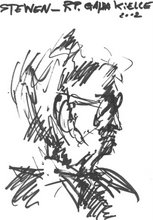I have seen several complaints on the internet from Polish people living in Britain about the amount English people swear. I can't say that I noticed this in England, but I may just be used to it. An external observer might notice such things better, so fair enough.
Indeed, I also noticed that Polish people swore continuously and openly. This was based purely on listening to people's use of the Polish 'K word' (pron. koorva) and its routinely used variations, compared to the English 'F word' (pronounce it yourself) and its less routinely used variations. The sounds of koorna, koorcha, koorda, etc are part of continuous everyday Polish conversation. I recognised they must be milder, but I sympathise with the English point of view that considers (for good or bad) that substitutes like 'fek' or 'fok' are absurd and hypocritical: everyone knows what you are saying.
I was therefore surprise to find that I offended people when I suggested that they swore. Any link with the swearword, of any sort, was not only completely denied, but the big Polish dictionary was brought over to prove me wrong. It was completely inconclusive, but I got the point. Since the sound similarity and identical usage are obvious, I accepted that the Polish language had evolved a system of non-vulgar exclamations. So, if English people swear more, this is simply because there is a different assessment of what is vulgar or not.
Then, a forgotten Polish dictionary appeared, which had the family in fits of laughter. The Ślownik Eufemizmów Polskich - Dictionary of Polish Euphemisms - published by PWN tells me that I was right and that all these uses are vulgar. As the linked page describes it, the dictionary "provides the milder substitutes not only of obscene words, but also of those which the user would for some reason like to avoid" ie it is like saying 'fek' in English. These may normally be innocent exclamations in Poland, with the vulgarity forgotten, but from an English cultural viewpoint, Polish people do swear continuously and openly. The difference is just the degree of offensiveness.
The dictionary has 43 headline euphemisms for the 'K word'. Some are direct replacements, but others are used to refer to the word, as I have done here. 'PKP' is an interesting example, roughly equivalent to 'f**king beautiful' with the negative meaning of something bad. I was surprised to find that 'Matko Bosko' (mother of god) is not included, which is also routinely used as a replacement. I remember going in to a local bar for a cup of coffee when an angry drinker was raving about something or other. When the barmaid - barmother, really - reprimanded him for swearing too much, he immediately switched to 'Matko Boska', with the transition marked by a loud 'Matko Boska Częstochowska', with his fist banging in time on the bar - the implied meaning of a very angry 'f**king hell' very unmistakeable. Matko Boska Chernst-ohovska - it rhymes - is the most important miracle giving religious picture in Poland. For someone brought up in an old-fashioned English school, this therefore combined the extremes of both vulgar and blasphemous language - we were told off for saying "Jesus'. In Poland, the response was 'that's better'. Fascinating.
I also had to look up 'jej', which is the standard word in children's programmes. I wondered what the English version would be: it seems to relate to the Polish version of 'balls' or 'bollocks', but the Kompas English Language Translator and Dictionary's closest equivalent gives me 'gee'. The euphemism dictionary's index points to the 'koorva match' list.
Wednesday, 6 October 2010
Subscribe to:
Post Comments (Atom)


2 comments:
For Poland's thick (which probably makes up around 30%-40% of the population, ie. fewer than in the UK), the 'k' word is merely punctuation, a conversational device like a 'sort of'', 'like', 'you know' etc.
I have to travel with this element of Polish society on the Koleje Mazowieckie train, and a typical conversation will go like this: 'Yesterday koorva I had to koorva fix the koorving lawnmower which was koorva koorved, but I couldn't koorva find the right koorving spanner, koorva.' All said in an entirely matter-of-fact tone of voice.
Over-use of the 'k' word shows above all a lack of mental agility, not to mention education and upbringing.
"Jej" isn't connected to "jajo" (an egg), I think it originated from "O Jezu!" -> "O Jeju!" -> "jej".
Poles don't consider exclamation phrases like "Matko Boska!", or "Jezu!" to be vulgar. For example it's perfectly normal for a mother to say to her child: "Matko Boska, dinner is cold, where you have been the whole time.". Or similiar.
It's strange, because dekalog says not to use the name of God for lesser purposes, but language is strange thing sometimes, it shows Poles take catholicism with a grain of salt - they comply where it is "reasonable" and "important" for them, and disobey, where it isn't.
Post a Comment